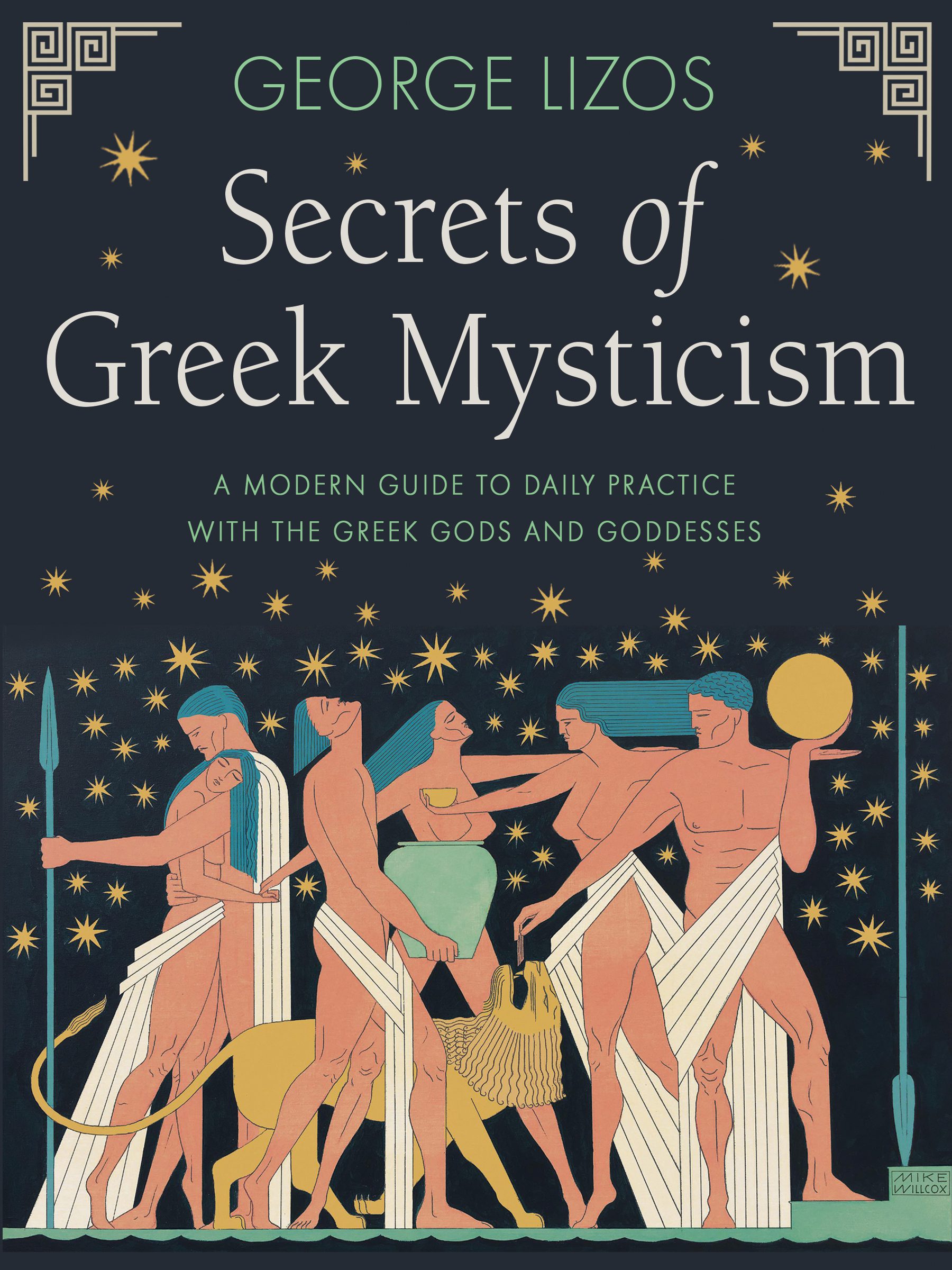An Excerpt from “Secrets of Greek Mysticism” by George Lizos
Setting Up Altars to the Gods
An altar is a portal between the sacred and the profane. It is a bridge between the spiritual and earthly realms—a creation that aims to bring the gods into the physical realm so we can have an easier, deeper interaction with them. Therefore, setting up an altar opens up a portal to the spirit world and eventually transforms a secular space into one that is sacred.
Altars have been used by most indigenous traditions around the world, including the ancient Greeks. Since the beginning of time, humans have felt the need to communicate with the spirit world and have built physical altars with the aim of channeling and communicating with the nonphysical realm.
What to Include on the Altar
There are many schools of thought around setting up altars. In this section, I’ll share what we know about ancient Greek altars coupled with tips from my personal experience.
Place
Although outdoor altars were common in classical times due to the layout of ancient houses, it may be more convenient to set up your household altar indoors. You can set up your altar on any surface in any room of the house. It could be on a side table in your bedroom, a shelf on your bookcase, a corner of your office desk, or simply a corner of the floor. However, I suggest that you set up your altar in a quiet space in a common area, especially if you plan on performing the rituals with the entire family.
Shape
Traditionally, Greek altars were rectangular. However, feel free to give your altar a shape that has meaning for you and for the god or goddess you’re working with. It could be a circle, square, pyramid, star, or any other shape you feel inspired to use.
Altar Cloth
Setting up your altar on a piece of cloth is a symbolic way to set its extent and boundaries. It’s also a simple way to transform a secular surface to something more sacred. Choose the colors and materials of your altar cloths mindfully so that they make sense for your chosen god or goddess.
Hearth
Our modern lifestyle doesn’t always allow for a hearth to be permanently lit in the house, so the next best option is candles, an oil lamp, or even an electronic candle or lamp if you want to avoid fire completely. Always use natural substances, such as beeswax and soy wax candles or olive oil for the lamp.
Cleansing Water
Known as khernips, cleansing water is used specifically for cleansing and purifying our energy before we perform any kind of ritual. You can make it yourself by using either spring water or saltwater and setting the intention that it clears and purifies your energy. It’s important to avoid using tap or stagnant water, and always drain and clean the bowl following the ritual. You can learn more about creating cleansing water in my book Protect Your Light.
Statues
During rituals, the statues are more than just representations of the gods; they embody the gods’ essence and should be treated with the utmost respect. Although you can purchase statues for affordable prices from many online retailers, you can also use any sculpted or unworked natural materials as statues for the gods. For example, you can choose stones, crystals, and pieces of clay or wood. In fact, in the archaic period Greeks used xoana (singular xoanon) to honor the gods, which were often uncarved pieces of wood.
If you choose to purchase your statues, it’s important that you choose statues depicting the god’s or goddess’s whole body rather than their busts or replicas of vandalized statues depicting the gods with missing limbs and other damage (most of which were performed by the early Christians).
Although statues are helpful aids to connecting with the gods, they aren’t essential for your ceremonies, and you don’t need to include them if you don’t want to. Your intention to connect with the gods is the most important component of the ritual.
Ritual Dagger
Similar to the Wiccan athame, a ritual dagger is used symbolically to protect the altar from negative intentions, people, and energies. You can use any dagger for this purpose, but it’s best to choose something that looks and feels sacred to you and that you use only as part of your ceremonies.
Storage
Near your altar, you may dedicate an additional surface or storage space for the statues (if you choose to include them) and other ritual items. It’s important to have 200 Connecting with the Gods specific ritual items used solely for your ceremonies, and consecrate them using the practice in the next section.
Incense
The ancient Greeks used different incenses to honor each god, many of which you can find in the “Symbolism” section of each god’s chapter. Traditionally, they used a tripod burner to burn the incense and other offerings, but you can use any burner you prefer. Personally, I’ve handmade a ceramic tripod burner, as well as most of my ceremonial tools, in my pottery class. If you have the time and energy to make your own ritual items, it’s a great way to add your own personal essence to them and deepen your practice.
Offerings
Although the ancient Greeks often sacrificed animals to the gods, this is no longer a common practice. Instead, we now offer grains, fruits, and flowers as a way of acknowledging, showing gratitude, and reaching out to the gods. For this purpose, have a tray or a bowl that you can use to make your offerings during the ritual and potentially leave on the altar table. I often arrange a selection of grains in a tray in a visually appealing way and leave it on my altar until the next ritual.
Libations
A libation is the ritual pouring of a liquid—usually red wine, olive oil, honey, milk, or water—in honor of gods, heroes, other minor deities, and the dead. For this purpose, have a large bowl to pour in your libations, and another vessel to store the liquid. When offering a libation to the Olympian gods, you should always use red wine, while for chthonic (subterranean) deities, minor gods such as the Muses and the Nymphs, heroes, and the dead, you should instead use milk mixed with honey, or water. Libations to chthonic gods and the ancestors (known as a choe) are poured directly into the earth rather than your altar libation bowl.
Additional Items
In addition to or in lieu of the traditional ritual items used by both ancient and contemporary Greek pagans, feel free to make the altar your own by arranging and decorating it in a way that’s aesthetically pleasing and feels right to you. Remember, you’re setting up a sacred space to help you commune with the gods. The more personal you make it, the easier it’ll be for you to connect.
A great way to bring life into your altar is to include natural items, which I like to call gifts from nature. Such items may include crystals, stones, soil, flowers, leaves, shells, sea glass, tree bark, fallen branches, or anything else you’re guided to collect from the natural world. Always be mindful not to dismantle any animal’s shelter or home. Walk softly upon the land and take only what you’re intuitively guided to, with love and respect in your heart. If you feel guided to collect flowers or plants, it’s important to intuitively ask them for permission before you cut them, and do so only if you get a yes.
Laying Out Your Altar
Setting up your altar is a ritual in and of itself. Once you have all the items and have spent some time planning how you want it to look, lay down your altar cloth, and with intention, prayer, and ceremony, place each item on the altar. Notice how you feel while setting up your altar, and include only items that inspire a sense of joy and upliftment. You’ll know when your altar is complete by the emotion you feel when it’s done! You’ll feel a sense of completeness or open-heartedness and joy along with reverence, as the items you’ve placed create the perfect energetic combination to bring in your chosen god’s energy.
Consecrating Your Altar
Consecrating your altar means to purify the energy of both the space the altar is set up in and the items you’ve included. Physical space and the items you’ve chosen all absorb vibratory frequencies from their surrounding environment as well as the people who have interacted with them (the ancient Greeks called this miasma, which means energetic pollution). Consecrating your altar resets the energy of everything so it can better align with the energy of the gods.
Follow these steps to consecrate your altar:
- Start by practicing the Meditation Prep Process from Chapter 8 and bring yourself into a meditative state.
- Choose your cleansing tool. There are many cleansing elements and tools you can use to cleanse your altar and ritual items. The most common cleansing aids used in ancient Greece were fire (in the form of sage and incense) and water (usually seawater or flowing water from springs and rivers), but you can also use sound (such as bells and gongs), essential oils, or your inner light channeled through your hands.
- Bring your chosen tool/s close to your heart. With eyes closed, call upon the oversoul of the tool to activate its power and support you in this process. Intuitively, you may feel your tool vibrating or lighting up in some way, signifying it’s ready to use.
- Use the tool to cleanse your altar space in an intentional, ceremonial way. For example, if you’re using lit sage, wave the smoke above, below, and around your altar with the intention that it’s cleansing all negative energy.
- After you’ve cleansed the altar, do the same for all the ritual items. Take each item one at a time and use your chosen tool to cleanse and purify it from all negative or residual energy.
- When you feel the space and your ritual items have been consecrated, place the tool close to your heart and thank it for its assistance.
Activating Your Altar
After you’ve consecrated your altar, the next step is to dedicate and activate it so it serves as a sacred space to strengthening communication between you and the gods you’re revering.
Follow these steps to activate your altar:
- Start by practicing the Meditation Prep Process from Chapter 8 and bring yourself into a meditative state.
- Place both of your hands on your chest and focus your attention in the center of your heart. Visualize a bright golden light extending from your heart outward and into your palms. This is your own inner light and life-force energy.
- Extend your hands outward to face the altar, visualizing the light washing over all the altar pieces and the surrounding space, instilling it with your loving energy and intention. Stay here for as long as it takes for your altar to feel elevated.
- Dedicate the altar to the gods you’re working with by saying and changing the call to the appropriate god: “I call upon [name of the gods] to enter this space and render it sacred, creating a clear portal of communication between the physical and spiritual realms. Thank you, and so it is.”
- When you’re done, place your hands on your chest to end the process and ground your energy into the Earth.
Animating the Statues
As I mentioned earlier, statues aren’t just representations of the gods, they act as gateways for the gods’ presence during the rituals. They embody the gods’ presence. Before they can take on this function, you need to animate them, meaning to invite the gods represented to bless and embody them.
Here’s the process to animate the statues:
- Having cleansed the statues, prepare a tray or bowl of a mix of grains, known as panspermia in Greek.
- With intention, circle the tray over each statue in a clockwise direction while reciting the god’s Orphic hymn (which you can find in the gods’ respective chapters) and pour the grains on the statue.
- While doing so, visualize the gods’ light entering and activating the statues, blessing them with their presence.
- Once you’re done, your statues are animated and ready to be used in your ceremonies.
Dismantling the Altar
Before you perform a new ritual, it’s important to dismantle your altar from the previous one, then consecrate and ground the energy of your altar space. The dismantling process should be carried out with the same sense of ceremony and reverence as setting up your altar, to show your gratitude for the work you’ve done with the gods.
Follow these steps to dismantle your altar:
- Start by practicing the Meditation Prep Process from Chapter 8 and bring yourself into a meditative state.
- Slowly and ceremonially, remove each item from the altar, holding it in front of your heart and silently thanking it for the role it played in your ritual.
- Having dismantled your altar, use one or more of the consecration tools you used previously to cleanse the altar pieces and space, preparing them for the next ritual.
Now that you know how to set up and dismantle your altars, in the next chapters I’ll share guidelines for performing your monthly festival rituals, as well as the new moon and full moon rituals.
—George Lizos, Chapter 23, Copyright © 2024
Featured Book
Secrets of Greek Mysticism
A clear introduction to the spirituality, beliefs, rituals, and gods and goddesses of the Greek pantheon from a modern practitioner.




